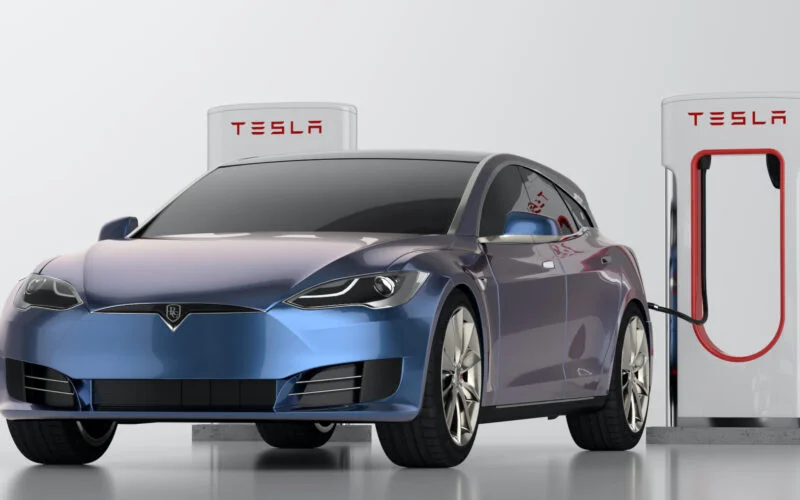Tesla electric vehicle technology has revolutionized the automotive industry. The company, founded by Elon Musk, puts forth a range of vehicles that run on lithium-ion batteries and can be charged at home or public charging stations. This technology is highly efficient and provides drivers with greater control over their carbon footprint.
Furthermore, advancements in this technology have made it increasingly affordable for car owners to make the switch from traditional fuel-powered vehicles to electric ones. The power behind Tesla's electric vehicles comes from either battery packs or solar energy cells located inside the car itself.
These batteries are designed to last hundreds of miles before needing recharging, allowing drivers more flexibility than ever before when it comes to where they travel without having to worry about running out of charge.
Additionally, these batteries require minimal maintenance compared to those found in internal combustion engines which can require frequent oil changes and other servicing needs over time.
All of these factors combine to create overall cost savings for drivers as well as increased environmental benefits due to fewer emissions being released into the air.
READ ALSO: Tesla's Powerwall Battery Storage System
- Overview Of Electric Vehicle Technology
- Benefits Of Tesla's Electric Vehicles
- Battery Packs And Solar Energy Cells
- Range And Recharging Options
- Maintenance Requirements
- Cost Savings For Drivers
- Environmental Advantages
- Future Developments In Electric Vehicle Technology
- Frequently Asked Questions
- Conclusion
Overview Of Electric Vehicle Technology
Electric vehicle technology has seen a rapid increase in popularity over the past decade due to advancements in automation and AI integration. These two aspects of electric vehicles offer drivers unparalleled efficiency, convenience, and value.
Automation is used to control various systems within the vehicle such as powertrain components, climate controls, safety features, and navigation systems. This allows for an easier driving experience with less manual input from the driver.
AI integration provides a more tailored user experience by gathering data about the driver's habits and preferences which can be used to make recommendations or optimize performance settings.
In addition to these capabilities, electric vehicles also provide significant environmental benefits compared to traditional combustion engines. Electric cars emit fewer pollutants into the atmosphere than their gasoline counterparts, reducing emissions significantly while still providing reliable transportation options.
Furthermore, they require less energy consumption during operation since they are powered solely by electricity rather than burning fossil fuels like gasoline or diesel fuel.

The combination of low maintenance costs and reduced pollution makes electric cars an attractive option for many consumers looking for sustainable transport solutions.
Tesla's electric vehicles have taken this technology even further with sophisticated software-based features that enhance the overall user experience.
Their vehicles come equipped with advanced driver assistance systems (ADAS) that combine automated processes with human interaction for improved comfort and safety on the road.
Additionally, Tesla offers its customers access to exclusive charging networks throughout North America that allow them to quickly recharge their batteries at any time without having to worry about running out of juice on long trips.
With all these advantages combined, it is easy to see why Tesla's electric vehicle technology is one of the most popular choices today among drivers who want both convenience and sustainability in their automotive lifestyle.
Moving forward then we will examine some of the key benefits offered by Tesla's EVs specifically that may appeal to potential buyers.
Benefits Of Tesla's Electric Vehicles
Like a beacon of light in the dark, Tesla's electric vehicle technology has revolutionized transportation. Its combination of autonomous driving and zero emissions make it an ideal investment for those looking to cut their carbon footprint without sacrificing convenience.
Here are just a few benefits of this revolutionary innovation:
- Reduced Carbon Footprint – Electric vehicles do not emit any greenhouse gases that contribute to global warming, making them much less harmful to the environment than traditional gasoline-powered cars.
- Lower Maintenance Costs – With fewer internal parts and fluids required, electric vehicles require significantly less maintenance over time. This can result in significant savings in service costs compared to traditional automobiles.
- Increased Range – As battery technology continues to improve, electric vehicles have been able to extend their range beyond what was previously possible with gasoline-powered models. This allows drivers greater flexibility when planning longer trips or commuting distances.
- Autonomous Driving Capabilities – Many Tesla models now come equipped with self-driving capabilities, allowing drivers more freedom and safety on the road as they no longer need to actively monitor their surroundings while driving.
Tesla's electric vehicle technology is only part of its commitment to sustainability; its recent investments in battery packs and solar energy cells promise even greener solutions for the future of transportation.
Battery Packs And Solar Energy Cells
Tesla's electric vehicle technology has focused on utilizing and implementing battery packs that are equipped with several advantages. These advantages include the ability to store energy efficiently, resulting in a long-lasting charge for vehicles.
Additionally, Tesla advocates for recycling policies that promote sustainability and reduce environmental impact. Further, its charging infrastructure is an important component of the company's mission to make clean transport available to more people worldwide.

Solar energy cells have become increasingly popular within Tesla's electric vehicle technology due to their cost efficiency and potential for emissions reduction. Solar cells provide renewable power at no additional cost after installation, helping offset some of the costs associated with fueling traditional engines.
Additionally, solar cells are capable of powering both residential homes and commercial businesses independently from the electrical grid, thus reducing dependence on fossil fuels and providing a form of sustainable living.
Range and recharging options vary across different models of Tesla's electric vehicles. Some models offer higher ranges than others while some require longer periods between charges depending on usage patterns.
Different types of batteries allow users to choose between faster or slower recharge times depending on individual needs as well as budget considerations when selecting a model of Tesla vehicle that best fits their lifestyle.
In exploring these aspects further, it becomes possible to identify the optimal range and recharge time capabilities suitable for personal use cases.
See Also: Tesla's Powerwall Battery Storage System
Range And Recharging Options
At the end of the day, range and recharging options are two sides to the same coin when it comes to Tesla electric vehicles. To hit the nail on the head, both aspects ensure that drivers have a safe and reliable ride with minimal interruption.
To begin with, fuel efficiency is essential for any vehicle owner as this determines how far you can go before needing to charge or refuel.
When considering an EV such as Tesla, this number will depend heavily on driving conditions, battery age, and other factors that influence performance but typically ranges anywhere from 200-400 miles per full charge depending on make and model.
On top of that, charging infrastructure has become more accessible in recent years due to increased demand for EVs. There has been a surge in public fast chargers providing up to 250 kW of power while some companies even offer home chargers so owners can easily refill their cars at their own convenience.
Furthermore, Tesla itself is actively expanding its network of Superchargers which provide up to 150 kW of power allowing drivers to get back on the road quickly without having to wait long periods of time for their car's batteries to fill up again.
Overall, these features are put together to create a powerful combination for those looking for efficient travel solutions without compromising on safety or reliability. As maintenance requirements also need consideration when selecting an electric vehicle, we'll take a closer look into what these entail next.
Maintenance Requirements
Maintenance requirements for Tesla electric vehicles are relatively low when compared to traditional gasoline-powered vehicles. In addition, Tesla owners benefit from the use of alternative fuels that can significantly reduce their carbon emissions and help protect the environment.
Many Tesla models offer exceptional vehicle efficiency with a range of features designed to maximize fuel economy.
The following table illustrates some key maintenance components of standard Tesla vehicles:
| Maintenance Component | Frequency | Cost |
|---|---|---|
| Oil Change | 1 Year/10K Miles | $60-$80 |
| Tire Rotation | 6 Months/5K Miles | $20-$30 |
| Battery Checkup | 2 Years/25K Miles | $50-$70 |
In order to ensure optimal performance, it is important for drivers to adhere to recommended service intervals outlined in the owner's manual or by the manufacturer. Regularly scheduled maintenance will help maintain peak vehicle performance while maximizing battery life and potentially reducing repair costs over time.
Additionally, making sure all fluids are at proper levels and inspecting brakes, tires, lights, wipers, air filters, and other parts on a regular basis can save drivers money in the long run. Transitioning into cost savings for drivers, understanding these factors can be beneficial in determining if an electric vehicle like a Tesla makes financial sense based on one's driving needs.
Cost Savings For Drivers
The cost savings associated with Tesla's electric vehicle technology are noteworthy. Fuel efficiency is increased as it requires no gasoline and the charging networks offer convenience to owners.
Additionally, costs of maintenance tend to be lower due to fewer moving parts than in a traditional car engine:
- Electric vehicles have no oil changes
- No spark plug replacements
- No air filter or fuel filter replacement
- Reduced brake pad wear since regenerative braking recharges the battery when slowing down
- No exhaust system repairs needed
These advantages result in significant cost savings for drivers over time.
Furthermore, those looking to purchase an electric vehicle can take advantage of government incentives such as tax credits and rebates that may further reduce their overall cost.
As evidenced by these current trends, adopting electric vehicle technology has become increasingly attractive for both financial and environmental benefits.
Environmental Advantages
Tesla electric vehicles have the ability to reduce emissions of pollutants, decreasing the overall impact on the environment. As a result, the technology helps reduce air pollution, which is a major contributor to global warming and other climate-related issues.
Additionally, Tesla electric vehicles are powered by renewable energy sources, such as solar and wind, which are non-polluting and sustainable. This makes Tesla electric vehicles an ideal choice for individuals who are looking for a way to reduce their carbon footprint.
Reduced Pollution
By transitioning to Tesla electric vehicle technology, cities can reduce their pollution output and create a more sustainable future.
Smart cities are already beginning to take advantage of the benefits provided by alternative fuels such as electricity. This shift in transportation is enabling city dwellers to travel with fewer emissions released into the atmosphere.
In addition, electrical vehicles offer greater efficiency when compared to traditional gasoline-powered cars; for instance, an EV travels three times further than its gas counterpart on the same amount of energy.
As a result, cities that switch to EVs will see reduced dependence on oil imports while also helping them reach emission targets set by local governments.
Furthermore, research has demonstrated that EVs produce less noise pollution due to their quiet operation when compared to combustion engines.
The environmental advantages associated with this transition clearly demonstrate why Tesla's electric car technology should be employed in smart cities today.
Renewable Energy Sources
The transition to electric vehicles also presents the opportunity for cities to utilize renewable energy sources.
Not only do these energy sources offer a more sustainable option, but they can also be integrated into the existing electric grid and used in place of traditional power sources.
By taking this approach, cities can reduce their emissions output even further while still meeting local electricity needs.
Additionally, as technological advancements are made in the field of renewable energy, city governments may find that utilizing these resources becomes increasingly cost-effective when compared with fossil fuels.
This potential for savings could open up new avenues for emissions reduction strategies within urban areas.
The advantages provided by renewable energy sources make clear why transitioning to Tesla's electric vehicle technology is an important step towards creating a greener future.
READ ALSO: Elon Musk's Role in the Founding of Tesla
Future Developments In Electric Vehicle Technology
Recent advancements in electric vehicle technology are revolutionizing the automobile industry. According to a recent survey, more than 50% of consumers intend on buying an EV within the next five years.
Tesla has been at the forefront of this transformation, providing innovative solutions for powering and propelling cars. Autonomous driving capabilities have become increasingly popular with EVs, allowing drivers to go further without any manual intervention.
The development of self-driving vehicles is being actively pursued by Tesla and other manufacturers as it offers safer roads and greater efficiency.
Additionally, charging stations are becoming more prevalent across cities and towns, making long-distance travel easier than ever before.
Going forward, improvements in battery technologies will be essential for extending the range and decreasing recharge times. Adaptive cruise control systems can also be improved upon to allow smoother transitions between lanes when changing direction or avoiding obstacles.
With continued investment in research and development, EVs could soon become commonplace alongside traditional gasoline-powered automobiles.
Frequently Asked Questions
How Much Does A Tesla Electric Vehicle Cost?
The cost of a Tesla electric vehicle depends on the type and model chosen. The entry-level Model 3 costs around $35,000 USD while the performance version can go up to $56,990 USD.
Additionally, charging costs depend heavily on local electricity rates; however, Tesla's battery life is estimated at 500 km per full charge for most models.
Furthermore, according to research from 2019, Tesla drivers saved an average of $600-$800 in fuel costs each year compared to those who drive gasoline-powered cars.
How Long Does It Take To Charge A Tesla Electric Vehicle?
Charging a Tesla electric vehicle requires varying amounts of time depending on the vehicle model, the type of charger used, and its state of charge.
Generally speaking, most models can be charged from 0-100% in approximately 8 hours with a Level 1 charger or 4 hours with a Level 2 charger.
Fast charging can take as little as 45 minutes to reach an 80% battery capacity for some vehicles.
The cost for charging also varies by location but is typically between $0.12-$0.30 per kWh regardless of the type of charger used.
Does A Tesla Electric Vehicle Qualify For Government Incentives?
The dawn of electric vehicles has ushered in a new era of energy efficiency and emissions reduction.
In this regard, leasing options for Tesla electric vehicles have become increasingly attractive to those looking to make the switch from traditional fuel sources.
Government incentives are available for many purchasers or lessees of these vehicles, offering financial benefits as well as access to charging infrastructure that can drastically reduce refueling times.
With such a variety of advantages, it is no surprise that many people are now taking advantage of government incentives when considering an electric vehicle purchase or lease – particularly one made by Tesla.
What Safety Features Come Standard In A Tesla Electric Vehicle?
Tesla electric vehicles come standard with a suite of safety features designed to reduce range anxiety and provide autonomous driving.
These include Autopilot, which utilizes cameras, radar, and ultrasonic sensors for lane-centering steering and adaptive cruise control;
Automatic Emergency Braking (AEB), which uses forward-facing camera technology to detect imminent collisions from the front of the vehicle;
Full Self-Driving Capability (FSD), which enables automatic driving on city streets and highways using an advanced driver assistance system;
and Enhanced Summon, which allows drivers to move their cars without anyone in them.
All these features are designed to make Tesla electric vehicles safer than ever before.
Does Tesla Offer A Battery Replacement Or Upgrade Program?
Tesla offers a battery replacement or upgrade program, much like an oasis in the desert for their electric vehicle owners.
They provide various options to optimize and extend the lifespan of the batteries with respect to charging infrastructure and other upgrades.
Batteries are essential components of any electric vehicle and Tesla ensures that customers have access to ways to maintain them effectively.
The company's programs offer improved battery performance by making sure each component is tailored specifically for optimal efficiency over time.
Conclusion
Electric vehicles are becoming increasingly popular as people strive to reduce their carbon footprints and live more sustainably.
Tesla electric vehicles have emerged as an attractive option for those seeking a reliable, sustainable mode of transportation.
The cost of Tesla electric vehicles is competitive in comparison to other EV models; however, charging time can be longer than some expect.
Furthermore, depending on the state or country you live in, government incentives may be available that could reduce the overall purchase price of a Tesla electric vehicle.
In addition to its environmental benefits, safety features such as automatic emergency braking come standard with all Teslas; further offering peace of mind for owners.
For drivers looking for additional battery performance, Tesla also offers a battery replacement program that allows customers to upgrade without having to buy a new car.
With over 250 million miles driven worldwide by 2020, it's clear that many are turning towards Tesla's electric vehicle technology—and reaping the rewards!
Thank you for reading our article today! Please remember to share this article on social media to help others benefit too. It also helps us improve our algorithm and relevance to the public. Thanks for Sharring!!! Follow us on Socials: Facebook - LinkedIn - Twitter









